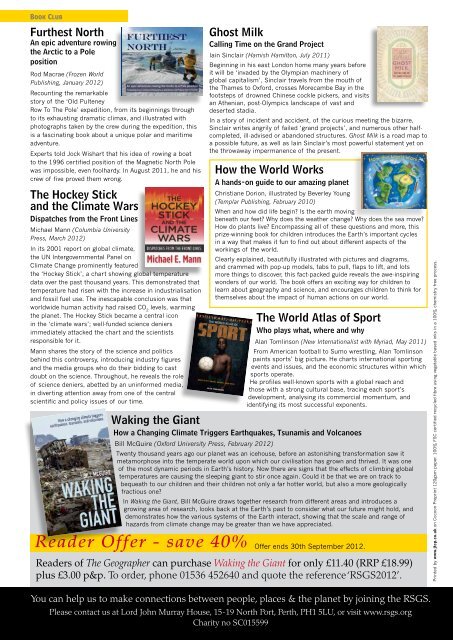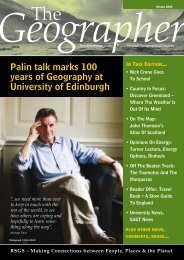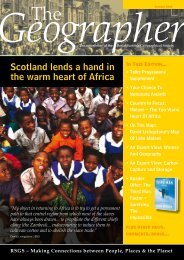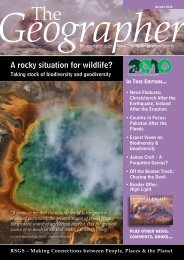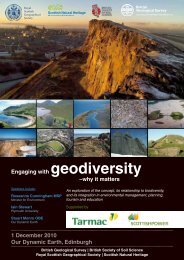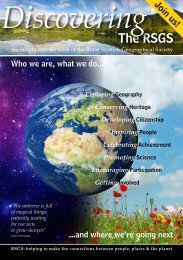Summer - Royal Scottish Geographical Society
Summer - Royal Scottish Geographical Society
Summer - Royal Scottish Geographical Society
Create successful ePaper yourself
Turn your PDF publications into a flip-book with our unique Google optimized e-Paper software.
Book Club<br />
Furthest North<br />
An epic adventure rowing<br />
the Arctic to a Pole<br />
position<br />
Rod Macrae (Frozen World<br />
Publishing, January 2012)<br />
Recounting the remarkable<br />
story of the ‘Old Pulteney<br />
Row To The Pole’ expedition, from its beginnings through<br />
to its exhausting dramatic climax, and illustrated with<br />
photographs taken by the crew during the expedition, this<br />
is a fascinating book about a unique polar and maritime<br />
adventure.<br />
Experts told Jock Wishart that his idea of rowing a boat<br />
to the 1996 certified position of the Magnetic North Pole<br />
was impossible, even foolhardy. In August 2011, he and his<br />
crew of five proved them wrong.<br />
The Hockey Stick<br />
and the Climate Wars<br />
Dispatches from the Front Lines<br />
Michael Mann (Columbia University<br />
Press, March 2012)<br />
In its 2001 report on global climate,<br />
the UN Intergovernmental Panel on<br />
Climate Change prominently featured<br />
the ‘Hockey Stick’, a chart showing global temperature<br />
data over the past thousand years. This demonstrated that<br />
temperature had risen with the increase in industrialisation<br />
and fossil fuel use. The inescapable conclusion was that<br />
worldwide human activity had raised CO 2<br />
levels, warming<br />
the planet. The Hockey Stick became a central icon<br />
in the ‘climate wars’; well-funded science deniers<br />
immediately attacked the chart and the scientists<br />
responsible for it.<br />
Mann shares the story of the science and politics<br />
behind this controversy, introducing industry figures<br />
and the media groups who do their bidding to cast<br />
doubt on the science. Throughout, he reveals the role<br />
of science deniers, abetted by an uninformed media,<br />
in diverting attention away from one of the central<br />
scientific and policy issues of our time.<br />
Ghost Milk<br />
Calling Time on the Grand Project<br />
Iain Sinclair (Hamish Hamilton, July 2011)<br />
Beginning in his east London home many years before<br />
it will be ‘invaded by the Olympian machinery of<br />
global capitalism’, Sinclair travels from the mouth of<br />
the Thames to Oxford, crosses Morecambe Bay in the<br />
footsteps of drowned Chinese cockle pickers, and visits<br />
an Athenian, post-Olympics landscape of vast and<br />
deserted stadia.<br />
In a story of incident and accident, of the curious meeting the bizarre,<br />
Sinclair writes angrily of failed ‘grand projects’, and numerous other halfcompleted,<br />
ill-advised or abandoned structures. Ghost Milk is a road map to<br />
a possible future, as well as Iain Sinclair’s most powerful statement yet on<br />
the throwaway impermanence of the present.<br />
How the World Works<br />
A hands-on guide to our amazing planet<br />
Christiane Dorion, illustrated by Beverley Young<br />
(Templar Publishing, February 2010)<br />
When and how did life begin? Is the earth moving<br />
beneath our feet? Why does the weather change? Why does the sea move?<br />
How do plants live? Encompassing all of these questions and more, this<br />
prize-winning book for children introduces the Earth’s important cycles<br />
in a way that makes it fun to find out about different aspects of the<br />
workings of the world.<br />
Clearly explained, beautifully illustrated with pictures and diagrams,<br />
and crammed with pop-up models, tabs to pull, flaps to lift, and lots<br />
more things to discover, this fact-packed guide reveals the awe-inspiring<br />
wonders of our world. The book offers an exciting way for children to<br />
learn about geography and science, and encourages children to think for<br />
themselves about the impact of human actions on our world.<br />
The World Atlas of Sport<br />
Who plays what, where and why<br />
Alan Tomlinson (New Internationalist with Myriad, May 2011)<br />
From American football to Sumo wrestling, Alan Tomlinson<br />
paints sports’ big picture. He charts international sporting<br />
events and issues, and the economic structures within which<br />
sports operate.<br />
He profiles well-known sports with a global reach and<br />
those with a strong cultural base, tracing each sport’s<br />
development, analysing its commercial momentum, and<br />
identifying its most successful exponents.<br />
Waking the Giant<br />
How a Changing Climate Triggers Earthquakes, Tsunamis and Volcanoes<br />
Bill McGuire (Oxford University Press, February 2012)<br />
Twenty thousand years ago our planet was an icehouse, before an astonishing transformation saw it<br />
metamorphose into the temperate world upon which our civilisation has grown and thrived. It was one<br />
of the most dynamic periods in Earth’s history. Now there are signs that the effects of climbing global<br />
temperatures are causing the sleeping giant to stir once again. Could it be that we are on track to<br />
bequeath to our children and their children not only a far hotter world, but also a more geologically<br />
fractious one?<br />
In Waking the Giant, Bill McGuire draws together research from different areas and introduces a<br />
growing area of research, looks back at the Earth’s past to consider what our future might hold, and<br />
demonstrates how the various systems of the Earth interact, showing that the scale and range of<br />
hazards from climate change may be greater than we have appreciated.<br />
Reader Offer - save 40% Offer ends 30th September 2012.<br />
Readers of The Geographer can purchase Waking the Giant for only £11.40 (RRP £18.99)<br />
plus £3.00 p&p. To order, phone 01536 452640 and quote the reference ‘RSGS2012’.<br />
You can help us to make connections between people, places & the planet by joining the RSGS.<br />
Please contact us at Lord John Murray House, 15-19 North Port, Perth, PH1 5LU, or visit www.rsgs.org<br />
Charity no SC015599<br />
Printed by www.jtcp.co.uk on Cocoon Preprint 120gsm paper. 100% FSC certified recycled fibre using vegetable based inks in a 100% chemistry free process.


